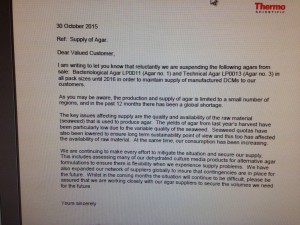Global Seaweed Shortage Forces Companies to Ration Agar

A global shortage of red algae seaweed has forced Thermo Fisher Scientific to ration supplies of agar, the growth medium used in laboratories to culture bacteria and fungi. Merck has stopped selling it as a raw material, although keeps selling it as dehydrated culture media. The lack of availability is due to fluctuating seaweed yields and to increased consumption.
Agar, also called agar-agar, is a jelly-like substance derived from the polysacchararide agarose, which structures the cell walls of agarophyte algae species belonging to the Rodophyta (red algae) phylum. Agar is formed by combining agarose with a mixture of smaller molecules called agaropectin. Since the 17th century, agar has been used as a gelling ingredient in desserts. More recently, it started to be used in microbiology laboratories to solidify culture media for bacterial growth. The best genera for this purpose are Gelidium and Gracilaria.
Wild seaweed is better, but the future is aquaculture
The supply is mainly affected by the low quality and availability of seaweed. Last year, yields were very low, and quotas were curtailed to guarantee sustainability. Another reason is the increased demand from non-industrial sectors, like human consumption: in four years, almost 30000 products based on agar have been released in Europe, and interest is growing in China. So far, laboratories haven’t found an alternative to agar with similar qualities.
The best agar comes from red algae hand-harvested in Japan, Mexico, Spain, Chile, Morocco and South Africa. Supply has increased thanks to aquaculture facilities in South East Asia, although the cultured seaweed quality is lower than the wild one. However, experts warn that the future of agar lies in aquaculture, which allows growing seaweed sustainably, in a controlled manner, saving natural resources and avoiding the spread of diseases.
Source: independent, foodqualitynews

